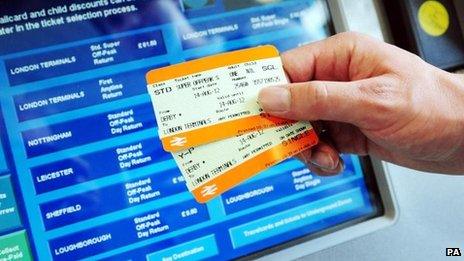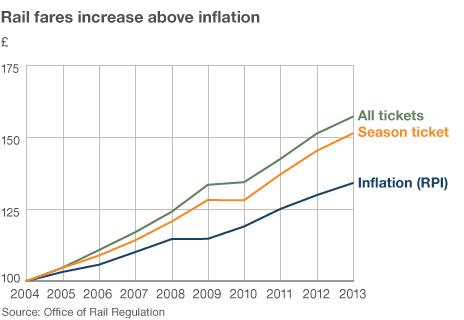Rail companies' power to raise fares in England to be curbed
- Published
- comments

Some rail fares have been allowed to rise at 5% above inflation
The rail industry's power to increase fares in England is to be curbed as part of a government drive to overhaul the rail fare system.
Until now, some regulated fares could potentially have gone up by 9.1% next January.
They will now be capped at 6.1%.
But campaigners say it is not enough, and point out that commuters will still have to pay an above- inflation increase next year.
Regulated fares are those which the government controls, and include season tickets, "anytime" single tickets around major cities, and off-peak inter-city return tickets.
They will go up in 2014 by an average of 4.1%, a number calculated using an average of inflation - as measured by the retail prices index (RPI) for July - plus 1%.
Train companies can add up to 5% on top of the average rise, although fares that go up by more than the average must be balanced by others that rise by less or fall.
The government plans to limit that extra increase to 2% in the future. But the provision for the average regulated ticket price to go up by 1% more than inflation remains.
'Taking action'
The move is part of the government's Fares and Ticketing review being published by the Transport Secretary, Patrick McLoughlin.
Mr McLoughlin told the BBC he thought rail users would get "quite a lot of benefit" from the cap.
He said: "Commuters will benefit from knowing there is a strict limit on the amount rail companies can put up the cost. People had been seeing 10% rises."
Those commuters who wanted to see more capacity on trains welcomed the government's investment into stations such as London Bridge, he said.
Mr McLoughlin added: "If we didn't take action, people would complain that we are not taking action. We are taking action, we are investing in the railways, we are trying to keep the price down as much as we can."
He said he was "always looking" at how to reduce the pressure on the passenger.
Mix and match
The government will also detail a pilot scheme that could see all long-distance rail tickets sold on a single-leg basis, not as returns.
It says this could allow passengers to more easily "mix and match" different ticket types when planning a return journey.
Other plans to be revealed by the Transport Secretary include:
'touch in, touch out' season tickets that could benefit part-time workers
a code of conduct for train companies designed to make it easier for passengers to choose the best ticket for their journey
strengthening of rules on how train companies alter opening times at station ticket offices.
Mary Creagh, the shadow transport secretary, said the new cap on fares would be "cold comfort for commuters".
"It has taken 18 months, delivers fare increases of up to 6% and is too little too late," she said.
"This announcement doesn't go as far as Labour's plans which would prevent train companies from increasing fares beyond one per cent above inflation."

- Published9 October 2013
- Published9 October 2013
- Published13 August 2013
- Published2 January 2013
- Published6 January 2012
- Published2 January 2013
- Published28 November 2012
- Published7 October 2012
- Published14 August 2012